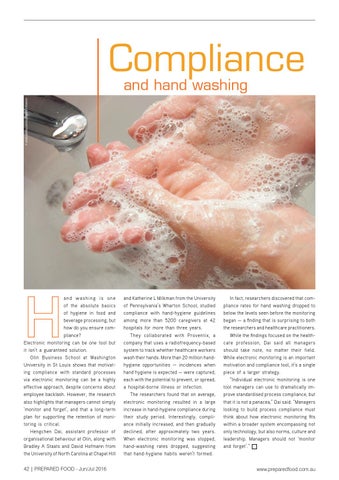Compliance © stock.adobe.com/au/Vladimir Voronin
and hand washing
and washing is one
and Katherine L Milkman from the University
In fact, researchers discovered that com-
of the absolute basics
of Pennsylvania’s Wharton School, studied
pliance rates for hand washing dropped to
of hygiene in food and
compliance with hand-hygiene guidelines
below the levels seen before the monitoring
beverage processing, but
among more than 5200 caregivers at 42
began — a finding that is surprising to both
how do you ensure com-
hospitals for more than three years.
the researchers and healthcare practitioners.
pliance?
They collaborated with Proventix, a
While the findings focused on the health-
Electronic monitoring can be one tool but
company that uses a radiofrequency-based
care profession, Dai said all managers
it isn’t a guaranteed solution.
system to track whether healthcare workers
should take note, no matter their field.
Olin Business School at Washington
wash their hands. More than 20 million hand-
While electronic monitoring is an important
University in St Louis shows that motivat-
hygiene opportunities — incidences when
motivation and compliance tool, it’s a single
ing compliance with standard processes
hand hygiene is expected — were captured,
piece of a larger strategy.
via electronic monitoring can be a highly
each with the potential to prevent, or spread,
effective approach, despite concerns about
a hospital-borne illness or infection.
“Individual electronic monitoring is one tool managers can use to dramatically im-
employee backlash. However, the research
The researchers found that on average,
prove standardised process compliance, but
also highlights that managers cannot simply
electronic monitoring resulted in a large
that it is not a panacea,” Dai said. “Managers
‘monitor and forget’, and that a long-term
increase in hand-hygiene compliance during
looking to build process compliance must
plan for supporting the retention of moni-
their study period. Interestingly, compli-
think about how electronic monitoring fits
toring is critical.
ance initially increased, and then gradually
within a broader system encompassing not
Hengchen Dai, assistant professor of
declined, after approximately two years.
only technology, but also norms, culture and
organisational behaviour at Olin, along with
When electronic monitoring was stopped,
leadership. Managers should not ‘monitor
Bradley A Staats and David Hofmann from
hand-washing rates dropped, suggesting
and forget’.”
the University of North Carolina at Chapel Hill
that hand-hygiene habits weren’t formed.
42 | PREPARED FOOD - Jun/Jul 2016
www.preparedfood.com.au
